Project News
March 31, 2017
Project News in March 2017
1. Faculty Development Training Course by Prof. HAYAKAWA Shigeru
This course organized as the first trial for improving and reforming the education systems in YAU was implemented by Prof. Shigeru Hayakawa, Professor Emeritus of Kagawa University, from the 4th to 14th of March, 2017 with the following aims;
- To organize workshops for capacity development of the project's counterparts and young academic staff to enhance their teaching capabilities.
- To promote curriculum development and formulate action plan and road map for improving existing curriculum of YAU by taking its current situation into consideration and by understanding the recent trials for curriculum development in Japanese universities, particularly in the field of agricultural sciences .
- To provide exercise to learn methods and measures for creating curriculum policy (curriculum map), making syllabuses and implementing students' evaluation of classes.
- To provide the university executives with advice as to curriculum development, improvement of teaching method and system for self-appraisal and evaluation of academic staff in YAU.
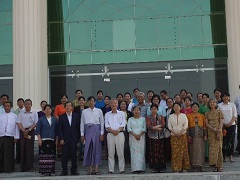 Participants
Participants
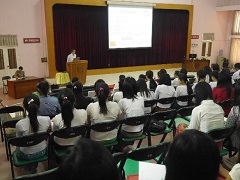 Prof. HAYAKAWA delivered presentation at Monday Seminar of YAU (6th March, 2017)
Prof. HAYAKAWA delivered presentation at Monday Seminar of YAU (6th March, 2017)
A total of 21 academic staff from all departments including those for basic subjects, such as Department Physics, Department of Mathematics, Department of English and Department of Myanmar, participated in the training course. Because it was essential for the university executives to understand the significance of improvement, special lectures were given every Saturday to the Rector, the Pro-Rectors and the Heads of the Departments.
As the on-going curriculum in YAU consists mostly of compulsory subjects provided by each Department and its SRP (Specialized Research Program), no curriculum map was prepared for the students. Taking this into consideration, the participants, by dividing them into some groups, were requested to create a curriculum map not for the sake of teachers but from the standpoint of students as a trial for the future improvement. Recognizing the importance of increasing selective subjects to broaden the range of student's choice of subjects, each group developed their discussion and proposed their expecting curriculum maps.
The participants were guided to formulate syllabuses of whole subjects in the YAU undergraduate education, and each participant was requested to make his/her syllabus by taking the following viewpoints into consideration:
- Syllabus should be made not only for making students easily understand the content of the subject, but also for clearly indicating the goals or achievement to be obtained by the students so that they would be able to set their own efforts.
- Syllabus would be a good material for improving teacher's capability for teaching, if it is utilized as a source for self-appraisal. It could contribute to strengthening of teachers' motivation, if the teachers would regularly revise it by taking students' evaluation into their consideration.
In addition, the training program provided lectures and practices related to the introduction of the evaluation (appraisal) system of individual academic staff in YAU. As all Japanese universities have long paid efforts to improve their management systems in the field of education, research, administration and social contribution, respectively, since the corporatization of universities started, a case of Kagawa University was introduced to accelerating the discussion among participants on the introduction of "evaluation" of individual academic staff to YAU. Through the discussion each participant appraised her/his activities, and. finally as a conclusion of this training, each group created an action plan for faculty development (FD) of YAU at the micro, meso and macro level.
The training program seems to have been timely implemented because the common interests in curriculum development had been shared among YAU academic staff. At the same time, it was also effective to enhance the momentum of curriculum reform that the university executives also partly participated in the training program. As a consequence, this program could have been a significant occasion to accelerate the YAU's curriculum reform for undergraduate education.
2. GIS/RS Training Course (2nd) by Dr. WATANABE Kazuo
As it is essential for YAU researchers to obtain skills and knowledge on GIS (Geographical Information System) in order to pursue some research subjects in the Project's Pilot Research Program, the project organized the second GIS/RS training course using drones by inviting Dr. Kazuo Watanabe (Senior Researcher, National Research Institute for Humanities and Nature) as a short-term expert.
A total 22 academic staff from 9 Departments and IT Department participated in the training course, of which about a half of them were the participants of the first training implemented last November. The training started with the review of the last training, and provided lectures on the fundamental theory related to the collection of Near Infrared (NIR) data and practices for actually collecting the data by flying drone and analyzing them using Pix4D and ArcGIS software.
As NIR sensor is an effective tool for observing and analyzing vegetation on the ground surface and moisture content in the soil, it is expected through this training that the measurement using drone would be effectively applied by pilot research groups. In fact, some members of the Pilot Research Group B, who took the first training course, had voluntarily organized a drone-study group to make themselves familiar with the use of drone, and the project welcomes such voluntary efforts as a good example of the consequence of training program.
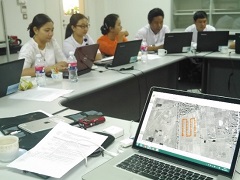 Practice for flight course setting (20th March)
Practice for flight course setting (20th March)
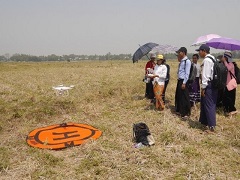 Drone flight practice at the pilot research site (23rd March)
Drone flight practice at the pilot research site (23rd March)
3. "Analytical Chemistry" Training Course by Prof. TOYODA Koki
Training Course, "Analytical Chemistry and Soil Microbiology" was conducted by Prof. Koki Toyoda, Tokyo University of Agriculture and Technology (TUAT), from 18th to 31st of March, 2017. Succeeding the 1st training implemented last August, this training focused on transferring knowledge and operational skills for using Gas-Chromatography and UV-Spectrophotometer. A total of 19 trainees and observers participated from Dept. of Agronomy, Dept. of Plant Breeding, Dept. of Soil and Water Science, Dept. of Plant Pathology, Dept. of Entomology and Zoology and Dept. of Horticulture, of which about a half of the participants had experienced the 1st training. Although it is important for the project to have the same participants as before to sustain the effectiveness of training, another half of the last participants could not join the course again due to job assignment adjusted in advance.
Following the lectures on soil microbial activity, such as soil respiration, enzyme activity and methane emission, and an additional lecture on experimental design for measuring these activities. , Prof. Toyoda provided the participants with a variety of practices using FID-GC and TCD-GC for measuring and analyzing soil and enzyme respiration under the different conditions of soil types and soil management and daily change of methane emission. In order to effectively train the participants, they were divided into several small groups so that individual participant could directly operate the equipment by him/herself.
In addition, Prof. Toyoda provided the participants with a training for quantitatively measuring phosphoric acid, which is an important indicator of soil fertility. Through this training, the participants could precisely learn the procedures of the measurement using UV-Spectrophotometer, such as how to handle reagents, how to prepare analytical reagents, how to obtain standard curves and others. The participants could also learn the significance of applying statistical analysis and appropriate method for expressing the results using tables and figures when they presented the reports of their measurement at the wrap-up session.
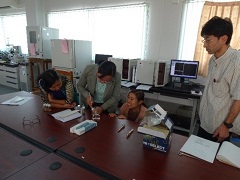 Methane Analysis by Gas-Chromatography (22nd Mar)
Methane Analysis by Gas-Chromatography (22nd Mar)
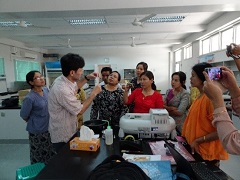 Phosphoric-acid Analysis by UV-Spectrophotometer (27th Mar)
Phosphoric-acid Analysis by UV-Spectrophotometer (27th Mar)
4.Training course of "water management technology" by Israeli experts
As the Embassy of Israel in Myanmar, through JICA Myanmar Office proposed the implementation of short-term training program in the field of water management at YAU by dispatching experts from Israel, the Project decided to support it in collaboration with the Embassy, because despite the importance of water resource management and water management technology human resources in the related fields are limited in YAU.
Two experts, Mr. Shlomo Kamer and Mr. Yoram Eisenstein, were dispatched and the training "water management technology" was held from 20th to 31st March, 2017.
The course was conducted with 14 participants in total consisting of 2 from Dept. of Agronomy, 5 from Dept. of Soil and Water Science, 3 from Dept. of Horticulture and 4 from Department of Agriculture (DOA under the Ministry of Agriculture, Livestock and Irrigation) in Bago and Mandalay Divisions. The training began with lectures on irrigation theory and irrigation methods, and practical training on a wide range of subjects concerning water management were conducted, such as plant-water relationship, irrigation management, drip irrigation, fertilization management under hydroponic cultivation, water quality management and measurement method of irrigation water, monitoring of soil water content etc. The project provided necessary support such as preparation and implementation of the in-campus logistic for smooth implementation of the training, transportation of experts during the training period.
The Ambassador of Israel has a great expectation for this training, so that he attended the opening ceremony held on 20th March and the closing ceremony held on 31st March, and at that opportunity, he emphasized his successive support to this kind of training courses and expressed strong expectation for continuous cooperation with YAU.
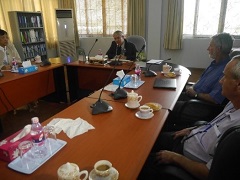 Opening Ceremony chaired by Israeli Ambassador (20th March)
Opening Ceremony chaired by Israeli Ambassador (20th March)
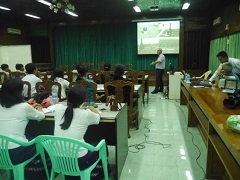 Lecture by Israeli experts (20th March)
Lecture by Israeli experts (20th March)
5.Implementation of Pilot Research
1) Each research group in the Pilot Research Program conducted fieldworks as follows.
- 4th, 11th, 18th and 25th of March:
RB-03 group collected insects and re-located and re-installed insect traps for next seasons in 7 Townships in Nay Pyi Taw. - 4th to 15th March:
RC-01-2 group interviewed with traders and oil exporters of sesame in Yangon City and Mandalay City. - 24th to 26th March:
RB02-1 collected soil for sampling nematode in sesame field in Monywa city, Shwebo city and Sagain area. - 29th to 30th March:
RC02-3 has set insect traps in mango orchard in Kyaukse and Kume TS, Mandalay Division.
2) Laboratory and in-farm experiments were also conducted using the samples collected through previous surveys.
- RA-01-1(Plant Breeding Group)
About 100 cultivars transplanted last month, consisting of local varieties collected by the team, those provided by Seed Bank and breeding lines (F6) screened by the Dept. of Plant Breeding, were grown at the experimental farm of YAU. A team in the group completed the trials for measuring growth habits and yielding abilities of the varieties having deep-water tolerance which were collected at Thanatpin Township, Bago, and their growth and yield data are analyzed. 15 varieties including those from Thantpin are tested to determine the tolerant abilities for submergence. - RA-02-1 (Plant Pathology group)
Pathogens of rice blast and leaf blight collected in Zaya Thiri and Pyinmana were continuously cultured, and bacterial specimens from these samples were preserved. - RB-02-1(Plant Pathology group)
Identification of nematode was conducted using soil samples collected in sesame-growing areas in Magwe. - RB-03-1(Entomology and Zoology group)
The data related to chronological and seasonal changes of harmful insects, such as the kind of insects and population, has been accumulated to establish insect alert model. - RC-01-1(Agronomy group)
The changes in weight and moisture content of sesame seeds after storage have been measuring. A part of the samples was outsourced for component analysis. - RC-01-2:
Data analysis for those collected in the fields is continued.
- About JICA
- News & Features
- Countries & Regions
- Our Work
- Thematic Issues
- Types of Assistance
- Partnerships with Other Development Partners
- Climate Change / Environmental and Social Considerations
- Evaluations
- Compliance and Anti-corruption
- Science and Technology Cooperation on Global Issues
- Research
- JICA Development Studies Program / JICA Chair
- Support for the Acceptance of Foreign HRs / Multicultural and Inclusive Community
- Publications
- Investor Relations
